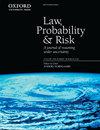Dynamics between Financial Development, Renewable Energy Consumption, and Economic Growth: Some International Evidence
IF 2.7
4区 社会学
Q1 LAW
引用次数: 5
Abstract
This thesis investigates the dynamics between financial development, renewable energy consumption, and economic growth in comparative analyses across 123 countries from 1990 to 2017. In the comparative analyses, we considered four income groups, namely low-income (LIC), lower-middle-income (LMC), upper-middle-income (UMC) and high-income (HIC) countries, but also five major regions such as Asia Pacific (APA), Europe & Central Asia (ECS), America (AMA, North America & Latin America and The Caribbean), Middle-East and North Africa (MENA) and Sub-Saharan Africa (SSA). This research is motivated by the need to show whether financial development may contribute to the protection of the planet (clean energy) and the eradication of poverty around the world. We also highlight the importance of good governance quality and renewable energies for achieving sustainable development goals (SDGs). This project is in line with the SDGs initiated by the United Nations to arouse attention towards clean water and sanitation, decent work and economic growth, peace, justice, and strong institutions affordable and clean energy in response to global warming. Hence, energy-saving technologies, i.e., renewable energies and sustainable growth, may play critical roles in this regard. The scrutiny of the empirical literature reveals that few studies have examined the nonlinear relationship between financial development, renewable energy consumption and economic growth in comparative analyses across different income groups and different regions while considering the multidimensional aspects of financial development. Notably, this study analyzes the nonlinear effects of financial development on renewable energy consumption and economic growth using different financial indicators. In a disaggregated approach, we alternatively use these indicators to represent four aspects of financial development, i.e., financial depth, financial efficiency, financial inclusion, and financial stability. Besides, this study examines the moderating effect of the quality of governance of public institutions on the relationship between financial development, renewable energy consumption, and economic growth across income levels and regions, unlike previous studies. In an aggregated approach, we built composite indexes of financial development and governance quality using eight (8) financial variables and six (6) indicators of governance quality. We make these indexes through the principal component analysis (PCA) technique to derive the overall effect of financial development on renewable energy consumption and growth while avoiding multicollinearity problems and the arbitrary choices of variables. The study also includes ten (10) control variables to avoid bias arising from omitted variables. The different estimations were performed by using two-stage least squares (2SLS), difference-GMM and system-GMM in most cases to deal with endogeneity problems, as well as to provide robust and reliable results. We also examined the causal relationships between financial development, renewable energy consumption, and economic growth using the panel vector autoregressive model (Panel VAR) following a similar approach to Granger causality framework with the GMM models. The study also provides detailed discussions of the results and specific policy implications for achieving the sustainable development goals in response to global warming across countries. These policy implications are well discussed in the last section of this thesis.金融发展、可再生能源消费和经济增长之间的动态关系:一些国际证据
本文对1990年至2017年123个国家的金融发展、可再生能源消费和经济增长之间的动态关系进行了比较分析。在比较分析中,我们考虑了四个收入群体,即低收入(LIC),中低收入(LMC),中高收入(UMC)和高收入(HIC)国家,以及五个主要地区,如亚太(APA),欧洲和;中亚(ECS),美洲(AMA),北美&拉丁美洲和加勒比)、中东和北非(MENA)和撒哈拉以南非洲(SSA)。这项研究的动机是需要证明金融发展是否有助于保护地球(清洁能源)和消除世界各地的贫困。我们还强调善治、高质量和可再生能源对实现可持续发展目标的重要性。该项目符合联合国发起的可持续发展目标,旨在引起人们对清洁水和卫生设施、体面工作和经济增长、和平、正义和强大机构的关注,以应对全球变暖,负担得起的清洁能源。因此,节能技术,即可再生能源和可持续增长,可在这方面发挥关键作用。实证研究表明,在不同收入群体和不同地区的比较分析中,很少有研究在考虑金融发展的多维层面的同时,考察金融发展、可再生能源消费和经济增长之间的非线性关系。值得注意的是,本文使用不同的金融指标分析了金融发展对可再生能源消费和经济增长的非线性影响。在分类方法中,我们交替使用这些指标来代表金融发展的四个方面,即金融深度、金融效率、金融包容性和金融稳定性。此外,与以往的研究不同,本研究还考察了公共机构治理质量在不同收入水平和地区的金融发展、可再生能源消费和经济增长之间的调节作用。采用聚合方法,我们使用八(8)个金融变量和六(6)个治理质量指标构建了金融发展和治理质量综合指数。我们通过主成分分析(PCA)技术得出这些指标,以得出金融发展对可再生能源消费和增长的整体影响,同时避免了多重共线性问题和变量的任意选择。本研究还包括十(10)个控制变量,以避免因遗漏变量而产生的偏差。在大多数情况下,采用两阶段最小二乘(2SLS)、差分- gmm和系统- gmm进行不同的估计,以处理内生性问题,并提供鲁棒性和可靠的结果。我们还使用面板向量自回归模型(面板VAR)检验了金融发展、可再生能源消费和经济增长之间的因果关系,该模型采用了与GMM模型的格兰杰因果关系框架类似的方法。该研究还详细讨论了结果和具体的政策含义,以实现各国应对全球变暖的可持续发展目标。这些政策影响将在本文的最后一节进行详细讨论。
本文章由计算机程序翻译,如有差异,请以英文原文为准。
求助全文
约1分钟内获得全文
求助全文
来源期刊

Law Probability & Risk
MATHEMATICSSTATISTICS & PROBABILITY&-STATISTICS & PROBABILITY
CiteScore
2.10
自引率
28.60%
发文量
8
期刊介绍:
Law, Probability & Risk is a fully refereed journal which publishes papers dealing with topics on the interface of law and probabilistic reasoning. These are interpreted broadly to include aspects relevant to the interpretation of scientific evidence, the assessment of uncertainty and the assessment of risk. The readership includes academic lawyers, mathematicians, statisticians and social scientists with interests in quantitative reasoning.
The primary objective of the journal is to cover issues in law, which have a scientific element, with an emphasis on statistical and probabilistic issues and the assessment of risk.
Examples of topics which may be covered include communications law, computers and the law, environmental law, law and medicine, regulatory law for science and technology, identification problems (such as DNA but including other materials), sampling issues (drugs, computer pornography, fraud), offender profiling, credit scoring, risk assessment, the role of statistics and probability in drafting legislation, the assessment of competing theories of evidence (possibly with a view to forming an optimal combination of them). In addition, a whole new area is emerging in the application of computers to medicine and other safety-critical areas. New legislation is required to define the responsibility of computer experts who develop software for tackling these safety-critical problems.
 求助内容:
求助内容: 应助结果提醒方式:
应助结果提醒方式:


